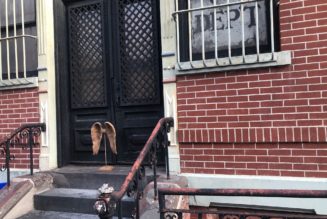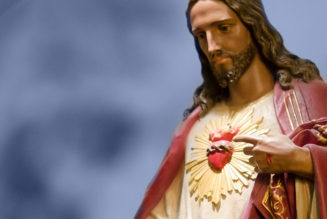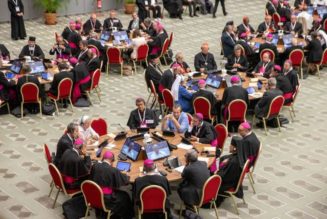
Jesus tells us to “Be not afraid” again and again in the Gospels — but this Sunday, the 33rd Sunday in Ordinary Time Year B, he says things calculated to frighten us.
That is because in his first coming to earth, he wanted to stress that we can come closer to God than we ever thought possible. In his second coming to earth, he warns, we may find ourselves unable to come close to him again, forever.
Jesus tells us something in the Gospel that 21st century Catholics might find hard to believe.
He says he will come “in the clouds with great power and glory” at the end of time. I, personally, have a hard time picturing that as a real event — but then I remember two things.
First, there is the Resurrection, which I cannot deny based on the evidence. After the Resurrection came the Ascension, when the apostles saw him disappear into a cloud and were told he will return in the same way.
Second, this Gospel fits closely with what has come before it in the Gospel.
Think of the way the Gospel of Mark unfolds. It begins with a fascinating new prophet, John the Baptist, speaking of the great one to follow him. Then Christ appears on the scene, expelling demons, healing the sick, and preaching the kingdom of God, though no one knows who he truly is.
Halfway through Mark, this mysterious miracle worker reveals that he is the Son of the living God, and that he is headed to Jerusalem to suffer and die. He enters Jerusalem in Mark Chapter 11 and immediately three strange things happen. First, he curses a fig tree for not having fruit, then he cleanses the Temple, overturning tables and chasing away the merchants, then he passes the fruit tree which has now withered.
Those who saw him curse the fruitless fig tree and cleanse the Temple, would have known exactly what this means. In our day, fans of the musical Hamilton also know what he means, because in one song, Washington quotes the prophet Micah about the fig tree. A fruitful fig tree is a place to rest and bask in the grace of God. A cursed fig tree is the opposite.
What follows in the Mark’s Gospel is a real life version of the lesson of the fig tree. After pressing his case against the Jewish leaders, he predicts that the Temple will be destroyed and then describes horrific tribulation that will come, after which “the sun will be darkened and the moon will not give its light and the stars will be falling from the sky, and the powers of heaven will be shaken.”
He is using Old Testament imagery to predict a great apostasy, where many will leave the faith.
This applies first of all to the Temple, but as the Second Reading makes clear, the Church the new Temple, in which Christ “offered one sacrifice for sins, and took his seat forever at the right hand of God; now he waits until his enemies are made his footstool.” St. Ambrose says Jesus is predicting the Church’s apostasy, too:
“The brightness of the faith will be dimmed by this cloud of apostasy: since the heavenly Sun grows dim or shines in splendor according to my faith. And as in its monthly eclipse the moon, by reason of the earth coming between it and the sun, disappears from view, so likewise the holy Church, when the vices of the flesh stand in the way of the celestial light, can no longer borrow the splendor of His divine light from the Sun of Christ.”
The darkening of the sun will come because we Catholics will love “this life” more than the next, says Ambrose. “Also the stars, that is, men surrounded by the praise of their fellow Christians, shall fall, as the bitterness of persecution mounts up,” he adds, “for so the good are proved and the weak made known.”
He is describing the Day of Judgment of the living and the dead when, the Catechism says, “the glorious Christ will reveal the secret disposition of hearts and will render to each man according to his works, and according to his acceptance or refusal of grace.”
Sunday’s First Reading, from the Book of Daniel, fills in more details. “Many of those who sleep in the dust of the earth shall awake; some shall live forever, others shall be an everlasting horror and disgrace.”
Those of us who put ourselves and our own self-aggrandizement at the center of our lives will be banished in our hideousness, while the faithful will “shine brightly” and “shall be like the stars forever.”
Jesus knows this is hard to believe, so he does two things to reassure us.
First, he says, “This generation will not pass away until all these things have taken place.” And sure enough, those who heard him saw the Temple destroyed by the Romans not long after.
Second, he says, “Learn a lesson from the fig tree. When its branch becomes tender and sprouts leaves, you know that summer is near.”
We have seen these “signs of summer” throughout the Church’s history.
The fig tree is a sign of God’s goodness, and the fruits of goodness are there in the Church from the Acts of the Apostles to St. Francis to Mother Teresa — and God’s zeal for justice stretches from St. John the Baptist to St. Thomas More in England to the martyrs of our own time. The fig tree is a sign of God’s truth, and sure enough, you see the fruits of God’s truth budding forth from St. Paul to St. Thomas Aquinas to St. John Paul II, and in scientists from St. Luke the physician to St. Albert the Great to St. Gianna Molla. The fig tree is a sign of God’s beauty, evident in the Church from St. John to St. Augustine to Hildegard of Bingen, from Dante to Flannery O’Connor.
They all believed that they would “see ‘the Son of Man coming in the clouds’ with great power and glory,” and they will all shine like stars when he “will send out the angels and gather his elect from the four winds, from the end of the earth to the end of the sky.”
They also all knew that “of that day or hour, no one knows, neither the angels in heaven, nor the Son, but only the Father,” and felt an urgent need to bear fruit so that the Lord wouldn’t find their lives curse-worthy when he comes.
Now it is time for us to do the same. As St. Augustine put it: “He came first in preaching, and filled the whole wide world. Let us not resist his first coming, that we may not tremble at his second.”
Join Our Telegram Group : Salvation & Prosperity







